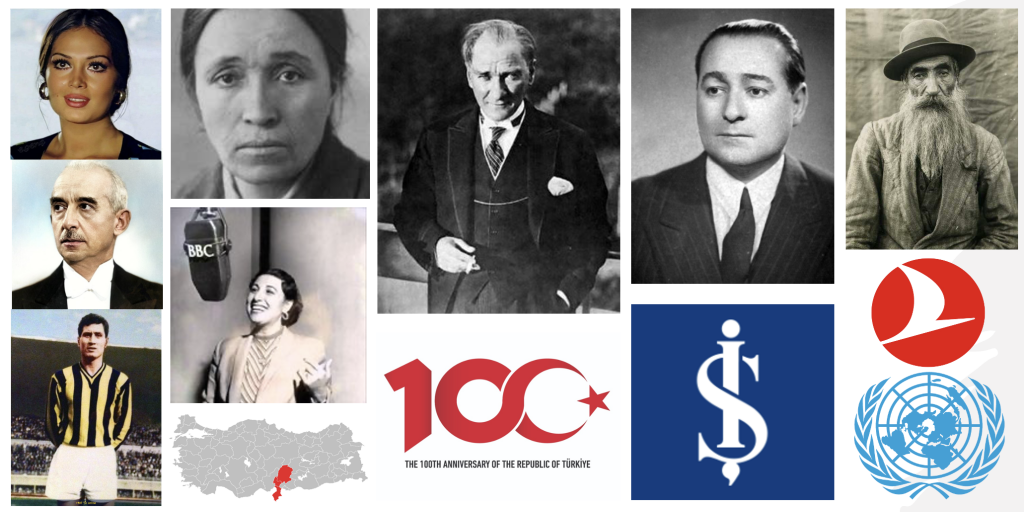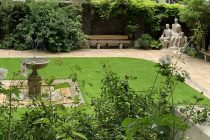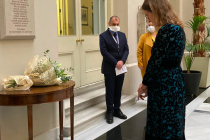Sunday, 29 October 2023 marks exactly one hundred years since the Republic of Türkiye was proclaimed. The centenary will be marked by celebrations not only across Turkiye, but also by Turks living all around the world.
This momentous anniversary is the perfect opportunity to reflect on what has been the Republic’s first magnificent century – the major milestones and the key characters that have helped define Turkiye politically, culturally and economically.
Gizem Ozturk provides a chronological guide to the highs and lows, significant events and personalities from these past 100 years. This is the first part of three, looking at the decades from the 1920s to the 1950s.
1920s: ✅
29 October 1923 – the Republic of Türkiye is proclaimed
Following the downfall of the Ottoman Empire during World War I, the Turkish National Movement, led by Mustafa Kemal Atatürk, came out victorious in the Turkish War of Independence (1919-1922). Not long after the Peace Treaty of Lausanne (24 July 1923), Türkiye was declared a Republic and its founder, Atatürk, elected as the first President of Türkiye on 29 October 1923.
Raft of modernising reforms by Atatürk
The 1920s were a busy decade for the newly established Turkish Republic, whose government, under President Atatürk’s supervision, set out to create a modern secular state modelled on various European countries.
Atatürk’s vision was nothing short of revolutionary, setting in motion a series of modernising reforms that included: the abolition of the Caliphate (3 March 1924), the ban on Sharia law (1924), the adoption of the Gregorian Calendar (1925), closure of religious convents and derviş orders (13 December 1925), Swiss Civil code replacing Islamic Law and abolition of the clause which defined Islam as a state religion (1928) were big steps in Türkiye’s secularisation.
The Latin alphabet was adopted, replacing the Ottoman Persian alphabet (3 November 1928), and the Qur’an was translated into Turkish, so that people could actually understand what was written. There were reforms on clothes as well, on 28 November 1925 the ‘Hat Reform’ banned the fez, which was a popular headdress during the Ottoman era.
First commercial bank
İş Bank, the first private, national bank in Türkiye was founded on 26 August 1924.
Sheikh Said Rebellion
In 1925, less than two years after the founding of the Turkish Republic, Sheikh Said of Piran led an Islamist Kurdish nationalist rebellion in a failed attempt to oust the Turkish government from southeast Türkiye and set up Kurdish autonomy. The İstiklal Tribunals were re-established in Ankara and Diyarbakır with authority to prosecute anyone trying to harm or oppose the newly formed state. They ordered the execution of leading figures in the rebellion, including Sheikh Said and Seyit Abdulkadir (son of Sheikh Ubeydullah, who led the first Kurdish nationalist struggle in the 19th century).
First census
On 28 October 1927, Türkiye held its first census. The Turkish Statistical Institute (TÜİK), founded as the Central Statistics Office on 25 April 1926, concluded there was 13,649,945 million people in the country following the first national count.
1930s: ✅
Women’s suffrage
Women were first granted their political rights on 3 April 1930, with the right to vote and be elected in municipal elections. Later, on 11 December 1934, these rights were extended to parliamentary elections. As a result, 17 female MPs entered the Grand National Assembly of Türkiye after being elected in February 1935, with another added following a by-election a year later.
Constantinople becomes Istanbul
Not only was Türkiye going through an era of modernisation and secularisation, it was also being Turkified from head to toe. Alongside the alphabet and language reforms, the names of cities and towns were changed as a result. In May 1930, the country’s most famous city, that was known as Constantinople for the past 1600 years, was officially renamed Istanbul by the Turkish government.
The birth of Turkish Airlines
One of the most successful airlines in the world today, Turkish Airlines was first launched as part of the Ministry of National Defence on 20 May 1933 as Türkiye’s first air carrier. Fesa Evrensev, the first Ottoman aircraft pilot, became appointed its CEO in 1934. The airline’s first overseas flight was from Istanbul to Athens in 1947. Eight years later, in 1955, the airline was rebranded ‘Turkish Airlines’.
Müzeyyen Senar
The 1930s was the decade when the doyen of Turkish Classical music, Müzeyyen Senar, came to prominence. The Bursa-born singer studied music at the Anatolian Musical Society in Üsküdar, İstanbul. Her powerful voice caught the attention of renowned musicians and composers, and in 1931, at the age of 15, she acquired a massive following through a Thursday programme on İstanbul Radio.
In the years that followed, she would perform in the city’s other great gazinos, as well as at high-profile events attended by Mustafa Kemal Atatürk, who was known for his love of Turkish classical and folk music. She quickly became one of his favourite singers.
The Dersim Rebellion and Sabiha Gökçen
The Dersim Rebellion is still one of the most controversial topics in Türkiye today, as some view it as a rebellion, while others a “massacre”. The Kurdish rebellion led by Alevi tribal leader Seyit Rıza in the Tunceli, Elazığ and Bingöl provinces, an area collectively known ‘Dersim’ back then, was against the newly formed Turkish state and demanded autonomy. It took three operations by the Turkish Armed Forces, from 20 March 1937 to December 1938, to suppress the uprising, which resulted in the deaths of thousands of Kurdish civilians and the hanging of leaders behind the rebellion, including Seyit Rıza.
Atatürk’s adopted daughter Sabiha Gökçen, who was the world’s first female Air Force combat pilot, also played a critical role in aerial operations to quell the uprising.
Atatürk’s Death
After leading the Turks to multiple victories on the battlefield followed by 15 arduous years as President, Mustafa Kemal Atatürk, ‘The Father of Turks’, passed away at 09.05 at the Dolmabahçe Palace in Istanbul. It is not an exaggeration to say a whole nation mourned the passing of Atatürk and his death made headlines around the world. Since then, the 10th of November is ‘Atatürk Remembrance Day’ — a national day of mourning the liberator and first president of Türkiye — where the country stops for two minutes of silence at exactly 09.05, while some gather at the Anıtkabir mausoleum where Atatürk rests to remember the great man and his incredible legacy.
Hatay Province
In July 1939, Hatay, which had been under the French Mandate of Syria following the Ottoman Empire’s downfall, officially became a province of Türkiye following a referendum.
1940s: ✅
Türkiye’s neutrality during WWII
Türkiye’s neutral stance during WWII remained until February of 1945 when it declared war on the Axis powers (Nazi Germany, Italy and Japan). Yet even then, it avoided any combat involvement, which was a notable achievement given how the war impacted states all around it. Instead, the Turks undertook grand trade with both the Axis and the Allies, raising Türkiye’s gold reserves from 27 to 216 tonnes in 1945. Türkiye also helped over 100,000 Jews to pass through from Europe to Palestine in 1945.
Great Famine in Athens
Türkiye was the first country to send humanitarian aid to Greece, on 6 October 1941, to relieve the Great Famine in Athens during the Axis occupation.
The Sultan of Turkish Cinema
Born in Istanbul on 28 June 1945 and known as the ‘Sultan of Turkish Cinema’, Türkan Şoray is one of the country’s most successful on-screen actresses, appearing in over 222 films, including Selvi Boylum Al Yazmalım (1978) and Dönüş (1972), the latter a film she also directed. Şoray made her film debut in 1962, winning multiple awards during her long career.
Şoray, along with Fatma Girit, Hülya Koçyiğit and Filiz Akın, were idolised during Türkiye’s first golden age of cinema – colloquially known as ‘Yeşilçam’ – during the 1960s and 70s. The four actresses became collectively known as Yeşilçam Dört Yapraklı Yonca [Yeşilçam 4-leafed clover].
Türkiye’s multi-party democracy
Türkiye’s multi-party democracy era started when the first opposition party, the National Development Party (MKP), was established by industrialist Nuri Demirağ on 18 July 1945. The following year, President İsmet İnönü’s government organised multi-party elections, which were won by his party, the Republican People’s Party (CHP). İnönü remained as the President of Türkiye until 22 May 1950.
Founder member of the United Nations
Türkiye was one of the 51 founding members of the United Nations when it was formed on 24 October 1945.
Footballer Lefter Küçükandonyadis
Lefter Küçükandonyadis is a Turkish footballer of Greek descent who played as a forward. He transferred to Fenerbahçe in 1947 and became an instant success. He is recognised as one of the greatest strikers to play for Fenerbahçe and Turkey, winning multiple national championship titles with Fenerbahçe and becoming Turkish top scorer twice in his career. Lefter played Fenerbahçe for 15 years across two spells at the club and he is one the few players whose names are included in the Fenerbahçe Anthem.
1950s: ✅
Adnan Menderes becomes Prime Minister
Adnan Menderes, the Leader of the Democrat Party, led his party to victory on 14 May 1950 during Türkiye’s first free elections, where ballots were made in secret and counted openly. The Democrat Party secured 52% of the votes. Menderes remained head of Türkiye for a decade until a military coup deposed of him.
US Army military base in Türkiye
The United States Air Force began to use the Incirlik Air Base in Adana, southern Türkiye, in December 1954 as part of the Cold War deterrent against the Soviet Union.
Istanbul pogrom
The Istanbul pogrom of 6-7 September 1955 left a dark stain on Turkish history when non-Muslim and mainly Greek minorities in the city were targeted and attacked by a large Turkish mob. Houses, shops, schools, casinos, and churches were destroyed over 9 hours of rioting and 12 people were killed.
Tensions were already high due to the events taking place in Cyprus between the island’s ethnically Turkish and Greek communities, but the pogrom was triggered by false news that Atatürk’s house in Thessaloniki had been bombed. It is speculated that the Turkish Democratic Party and Turkish state security organisations helped orchestrate the riots.
The result saw Istanbul’s Greek community significantly diminish over time, from 65,108 to 49,081 between 1955 and 1960. By 2008, Turkish government figures showed the community stood at just 3,000-4,000.
NATO , the Turkish Brigade and the Korean War
On 29 June 1950, Türkiye agreed to assist South Korea following the United Nation’s call for military assistance. Hence, the Turkish Brigade took part in the Korean War, attached to the US army and infantry divisions. The Brigade provided assistance from September 1950 until mid-summer of 1954.
Türkiye’s participation in the Korean War is also said to have secured their membership of NATO (North Atlantic Treaty Organisation). Türkiye joined NATO on 18 February 1952.
Main image, top, clockwise top left: actress Türkan Şoray, one of Türkiye’s first 17 female MPs Hatı Çırpan, Mustafa Kemal Atatürk, Democrat Party Leader and former Prime Minister Adnan Menderes, Alevi tribal leader Seyit Rıza, Turkish Airlines logo, United Nations logo, İş Bankası logo, Turkish Republic centenary logo, map of Türkiye with Hatay Province marked out, legendary footballer Lefter Küçükandonyadis, former Turkish President İsmet İnönü (far light middle), and Turkish classical music singer Müzeyyen Senar (left middle).




